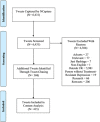#TreatmentResistantDepression: A qualitative content analysis of Tweets about difficult-to-treat depression
- PMID: 37350377
- PMCID: PMC10485331
- DOI: 10.1111/hex.13807
#TreatmentResistantDepression: A qualitative content analysis of Tweets about difficult-to-treat depression
Abstract
Introduction: Treatment-resistant depression (TRD) is depression unresponsive to antidepressants and affects 55% of British primary care users with depression. Current evidence is from secondary care, but long referral times mean general practitioners (GPs) manage TRD. Studies show that people with depression use Twitter to form community and document symptoms. However, Twitter remains a largely unexplored space of documented patient experience. Twitter data could provide valuable insights into learning about primary care experiences of TRD. In this study, we explored Twitter comments and conversations about TRD and produced patient-driven recommendations.
Methods: Tweets from UK-based users were collected manually and using a browser extension in June 2021. Conventional content analysis was used to provide an overview of the Tweets, followed by interpretation to understand why Twitter may be important to people with TRD.
Results: A total of 415 Tweets were organised into five clusters: self-diagnosis, symptoms, support, small wins and condition experts. These Tweets were interpreted as showing Twitter as a community for people with TRD. People had a collective sense of illness identity and were united in their experiences of TRD. However, users in the community also highlighted the absence of effective GP care, leading users to position themselves as condition experts. Users shared advice from a place of lived experience with the community but also shared potentially harmful information, including recommendations about nonevidence-based medications.
Conclusions: Findings illuminate the benefits of the TRD Twitter community and also highlight that the perception of a lack of knowledge and support from GPs may lead community members to advise nonevidenced-based medications.
Patient and public contribution: This study was led by a person with lived experience of TRD and bipolar. Two public contributors with mental health conditions gave feedback on our study protocol and results.
Keywords: Twitter; antidepressants; community; depression; qualitative research; treatment resistance.
© 2023 The Authors. Health Expectations published by John Wiley & Sons Ltd.
Conflict of interest statement
The authors declare no conflict of interest.
Figures
Similar articles
-
Evaluating Behavioral and Linguistic Changes During Drug Treatment for Depression Using Tweets in Spanish: Pairwise Comparison Study.J Med Internet Res. 2020 Dec 18;22(12):e20920. doi: 10.2196/20920. J Med Internet Res. 2020. PMID: 33337338 Free PMC article.
-
Using Twitter to Understand the Human Bowel Disease Community: Exploratory Analysis of Key Topics.J Med Internet Res. 2019 Aug 15;21(8):e12610. doi: 10.2196/12610. J Med Internet Res. 2019. PMID: 31411142 Free PMC article.
-
Using Twitter Comments to Understand People's Experiences of UK Health Care During the COVID-19 Pandemic: Thematic and Sentiment Analysis.J Med Internet Res. 2021 Oct 25;23(10):e31101. doi: 10.2196/31101. J Med Internet Res. 2021. PMID: 34469327 Free PMC article.
-
Analysis of Twitter Activity and Engagement From Annual Meetings of the Society for Vascular Surgery and the Society of Interventional Radiology.Ann Vasc Surg. 2021 Oct;76:481-487. doi: 10.1016/j.avsg.2021.03.011. Epub 2021 Apr 5. Ann Vasc Surg. 2021. PMID: 33831529 Review.
-
A Review of the Conceptualisation and Risk Factors Associated with Treatment-Resistant Depression.Depress Res Treat. 2017;2017:4176825. doi: 10.1155/2017/4176825. Epub 2017 Aug 3. Depress Res Treat. 2017. PMID: 28840042 Free PMC article. Review.
Cited by
-
Hype or hope? Ketamine for the treatment of depression: results from the application of deep learning to Twitter posts from 2010 to 2023.Front Psychiatry. 2024 May 10;15:1369727. doi: 10.3389/fpsyt.2024.1369727. eCollection 2024. Front Psychiatry. 2024. PMID: 38800065 Free PMC article.
References
-
- Dredze M. How social media will change public health. IEEE Intell Syst. 2012;27(4):81‐84. 10.1109/MIS.2012.76 - DOI
-
- Keyel J. Encountering and processing secondary traumatic stress during qualitative interviews with displaced Iraqis: a research note. Qualitative Research. 2020;21(2):295‐303. 10.1177/1468794120927679 - DOI
-
- Clement J. Leading Countries Based on Number of Twitter Users as of October 2019. Statista; 2019.
Publication types
MeSH terms
Substances
LinkOut - more resources
Full Text Sources
Medical



